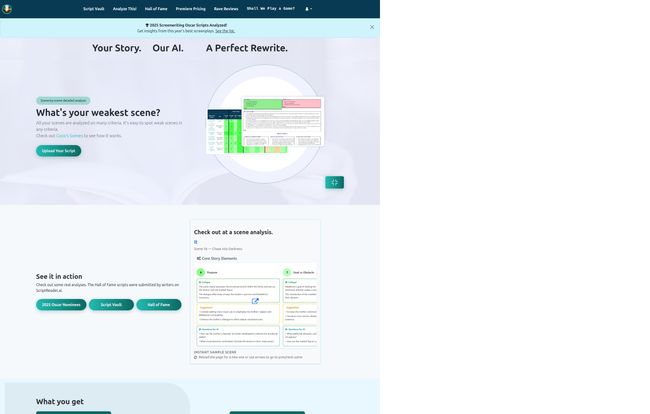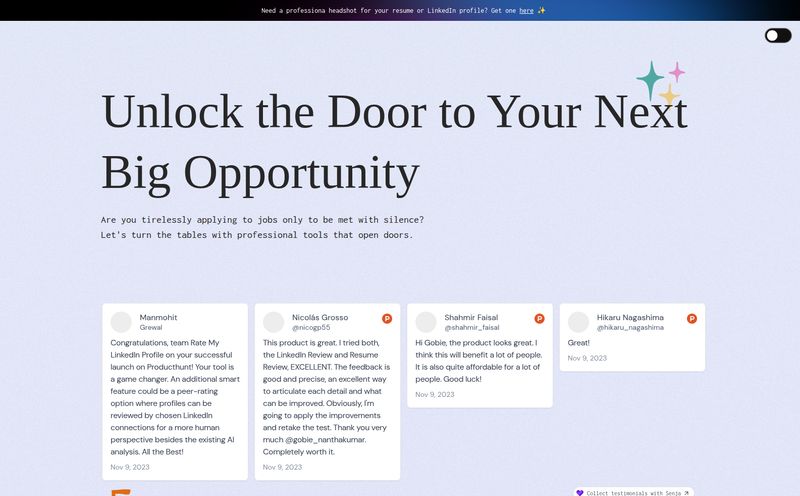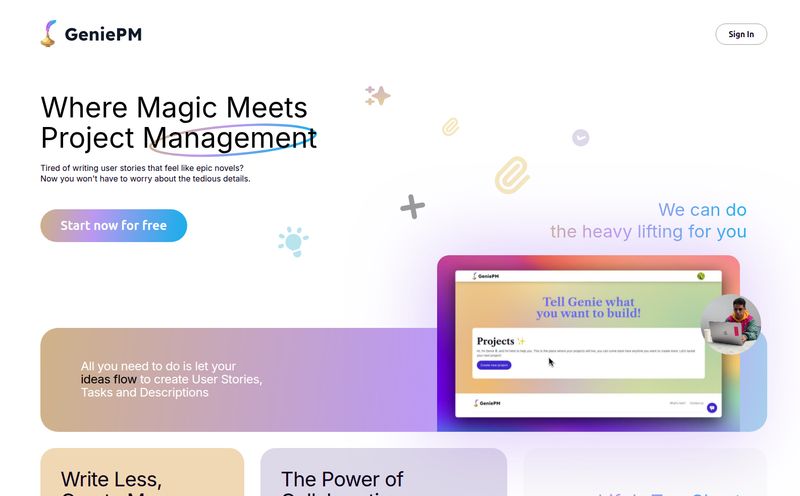I’ve been in the content game for a long, long time. I’ve seen trends come and go, from the keyword-stuffing dark ages to the current reign of E-E-A-T. But every now and then, something pops up that makes me lean in a little closer. Something that feels… different. And right now, that something is AI’s big, splashy entrance into the world of creative writing.
Specifically, screenwriting. We’ve all been there, right? You finish a draft, heart pounding, convinced you’ve just penned the next Chinatown. You send it to your trusted reader, your writers' group, that one producer's assistant you met at a mixer. And then… silence. Weeks of it. You start to wonder if they even opened the file. It's a special kind of agony.
So when I heard about tools like ScriptReader.ai, promising instant, detailed screenplay analysis, the cynical SEO veteran in me raised an eyebrow. But the writer in me? He was intrigued. An AI script doctor that never sleeps, never gets tired, and gives you notes in minutes? Let's talk about it.
So, What Exactly is ScriptReader.ai?
At its core, ScriptReader.ai is an artificial intelligence platform designed to read and analyze your screenplay. But this isn't your high school English teacher's spellchecker. We're talking about a tool that breaks down your script scene by scene, digging into the guts of your story—pacing, character arcs, thematic consistency, dialogue, and all that good stuff. It’s built to give writers, from first-timers to seasoned pros, a fast and objective look under the hood of their story engine.
And they’re making some smart moves. For instance, they offer free coverage for WGA members working on spec scripts. That's a pretty savvy way to show you're serious and not just another tech solution looking for a quick buck from aspiring artists. It builds a bit of trust right out of the gate.

Visit ScriptReader.ai
My First Spin with the AI Reader
Naturally, I had to kick the tires. The process is simple enough: you upload your script (in standard formats) and let the AI do its thing. What comes back is… a lot. It’s less of a gentle critique and more like a full-on diagnostic report for your story. It’s like getting your script’s report card, but instead of just a 'C-' in plot, it tells you why your protagonist’s motivation feels a little fuzzy in Act Two.
The Detailed Scene-by-Scene Breakdown
This is the main event. The tool literally goes through every single scene and gives it a grade. It flags pacing issues, identifies which scenes are driving the plot forward, and which ones are just… there. It’s a bit brutal, but also incredibly useful for spotting the fat that needs trimming. We all have those scenes we love that do absolutely nothing for the story, and this AI has no problem pointing them out with cold, hard logic.
More Than Just a Report Card
Beyond the grades, it gives you a high-level executive summary. It analyzes character arcs, identifies themes (or lack thereof), and even makes comparisons to similar, successful stories. One of its boldest claims is identifying a writer's “unique voice.” I’m still on the fence about whether a machine can truly quantify something so human, but the attempt itself is fascinating.
My Honest Take: The Good, The Bad, and The AI
Okay, so is it the future? Or just a fancy new toy? In my experience, it's a bit of both.
What I Genuinely Like
First off, the speed. The turnaround time is... insane. Seriously insane. Getting detailed structural notes in minutes instead of weeks is a massive workflow improvement. It allows for rapid iteration. You can rewrite a section and immediately run it through again to see if you fixed the problem. That's huge.
Second, the objectivity. An AI doesn't care about your feelings. It won't tell you “it’s great!” just to be nice. If your inciting incident is on page 30, it’s going to flag it. This kind of blunt feedback, while sometimes tough to swallow, is often what we need to hear. It helps you get out of your own head.
Where I'm a Bit Skeptical
Now, for the other side of the coin. Can an AI really understand subtext? Can it appreciate a joke that’s funny because of its awkward timing? I have my doubts. For all its analytical power, it's still looking for patterns and structure. It's a master of the science of storytelling, but I'm not yet convinced it understands the art. A human reader can feel the emotional current of a script in a way a machine probably cant.
There's also the risk of feedback becoming a bit generic if you rely on it too much. It's a tool to diagnose problems, not necessarily to provide the most creative solutions. It can tell you a character is flat, but it can't tell you that the character would be more interesting if they had a secret obsession with collecting antique spoons.
Breaking Down the Bill: ScriptReader.ai Pricing
For most of us, this is the bottom line. Can we afford it? The pricing structure seems pretty fair, especially when compared to human script consultants who can charge hundreds or even thousands.
| Plan | Price | What You Get |
|---|---|---|
| Free Trial | $0 | Analysis of your first three scenes, including story critique and pacing notes. |
| Director's Cut Script Analysis | $9.99 | The full package: executive summary, full scene-by-scene analysis, character arcs, thematic analysis, and 5 AI Scene Improvements. |
| AI Scene Improvements | $10 | An add-on pack of 100 AI-generated suggestions to improve specific scenes. |
| Reel Deal / Bulk Packages | Contact for Pricing | Custom packages for writers, agents, or managers who need to analyze multiple scripts. |
Honestly, for less than the price of a movie ticket, the Director's Cut analysis is a pretty low-risk investment to see how your script holds up under a microscope.
So, Who Is This For, Really?
- For the New Screenwriter: Absolutely. It's a fantastic, affordable crash course in screenplay structure. It will show you, in no uncertain terms, where you're going wrong and help you build good habits.
- For the Working Writer: I'd say yes, but with a caveat. Don't use it to replace your trusted human readers. Use it as a pre-reader. Run your messy first draft through it to clean up the obvious structural problems before you send it to a human whose time and opinion you value.
- For Agents and Managers: The bulk analysis feature is a clear sign they're targeting industry pros. It offers a way to quickly sift through a slush pile and find scripts with a solid foundation, which could be a huge time-saver.
Answering Your Burning Questions (FAQ)
Is ScriptReader.ai better than a human reader?
It's different. It's faster and more objective on structure, but it can't match a human's ability to understand nuance, subtext, and emotional impact. Think of it as a supplementary tool, not a replacement.
Does ScriptReader.ai steal your ideas?
This is a huge concern for writers. According to their policies, you retain all rights to your work. The platform is a tool for analysis, not for claiming ownership. As always, read the Terms of Service for any platform you upload your creative work to.
Can this tool actually help me sell my screenplay?
Indirectly, yes. It won't sell your script for you, but it can help you polish it into a much stronger, more professional package. A script with solid structure and pacing is far more likely to get a good reception from producers and agents.
Is the free version worth trying?
Definitely. Analyzing your first three scenes is a great, no-cost way to see how the tool works and whether its style of feedback is right for you before you spend any money.
How secure is my script on the platform?
They claim to use secure protocols for uploads. While no system is 100% foolproof, they operate like most cloud-based services. You upload, they process, and your work is tied to your account. Your script isn't just floating around on the public internet.
Final Thoughts
Look, ScriptReader.ai isn't a magic wand. It's not going to turn a bad idea into a great one. But that's not what it's for. Writing is rewriting, and this is a powerful new tool for the rewriting process.
It’s a diagnostic tool. A ruthless, lightning-fast, and affordable structural editor. It can help you find the cracks in your story's foundation so you can fix them. It’s one more weapon in the writer’s arsenal, and in a business this tough, I’ll take every advantage I can get. My advice? Give the free trial a shot. Upload a few scenes. See what the robot has to say. Just remember that at the end of the day, you're the writer. It's your story, and your creative gut should always have the final say.



